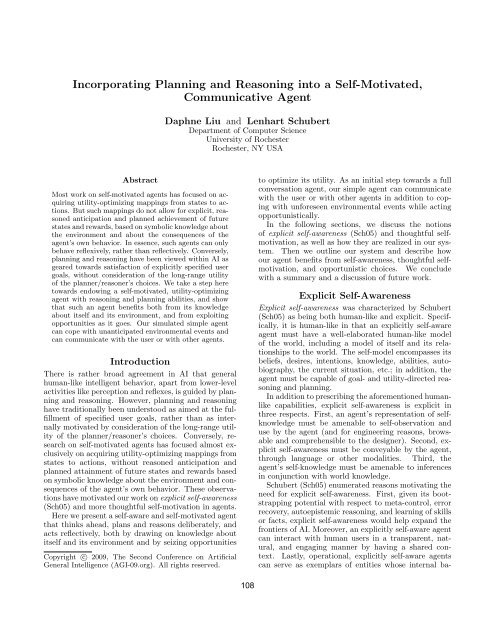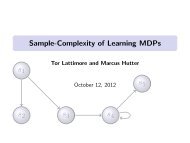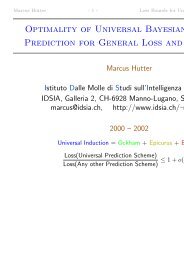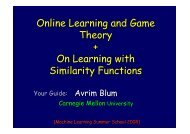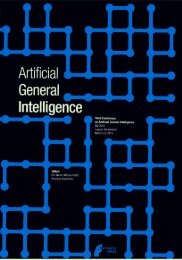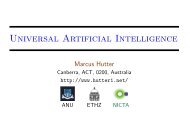A Framework for Evaluating Early-Stage Human - of Marcus Hutter
A Framework for Evaluating Early-Stage Human - of Marcus Hutter
A Framework for Evaluating Early-Stage Human - of Marcus Hutter
You also want an ePaper? Increase the reach of your titles
YUMPU automatically turns print PDFs into web optimized ePapers that Google loves.
Incorporating Planning and Reasoning into a Self-Motivated,<br />
Communicative Agent<br />
Abstract<br />
Most work on self-motivated agents has focused on acquiring<br />
utility-optimizing mappings from states to actions.<br />
But such mappings do not allow <strong>for</strong> explicit, reasoned<br />
anticipation and planned achievement <strong>of</strong> future<br />
states and rewards, based on symbolic knowledge about<br />
the environment and about the consequences <strong>of</strong> the<br />
agent’s own behavior. In essence, such agents can only<br />
behave reflexively, rather than reflectively. Conversely,<br />
planning and reasoning have been viewed within AI as<br />
geared towards satisfaction <strong>of</strong> explicitly specified user<br />
goals, without consideration <strong>of</strong> the long-range utility<br />
<strong>of</strong> the planner/reasoner’s choices. We take a step here<br />
towards endowing a self-motivated, utility-optimizing<br />
agent with reasoning and planning abilities, and show<br />
that such an agent benefits both from its knowledge<br />
about itself and its environment, and from exploiting<br />
opportunities as it goes. Our simulated simple agent<br />
can cope with unanticipated environmental events and<br />
can communicate with the user or with other agents.<br />
Introduction<br />
There is rather broad agreement in AI that general<br />
human-like intelligent behavior, apart from lower-level<br />
activities like perception and reflexes, is guided by planning<br />
and reasoning. However, planning and reasoning<br />
have traditionally been understood as aimed at the fulfillment<br />
<strong>of</strong> specified user goals, rather than as internally<br />
motivated by consideration <strong>of</strong> the long-range utility<br />
<strong>of</strong> the planner/reasoner’s choices. Conversely, research<br />
on self-motivated agents has focused almost exclusively<br />
on acquiring utility-optimizing mappings from<br />
states to actions, without reasoned anticipation and<br />
planned attainment <strong>of</strong> future states and rewards based<br />
on symbolic knowledge about the environment and consequences<br />
<strong>of</strong> the agent’s own behavior. These observations<br />
have motivated our work on explicit self-awareness<br />
(Sch05) and more thoughtful self-motivation in agents.<br />
Here we present a self-aware and self-motivated agent<br />
that thinks ahead, plans and reasons deliberately, and<br />
acts reflectively, both by drawing on knowledge about<br />
itself and its environment and by seizing opportunities<br />
Copyright c○ 2009, The Second Conference on Artificial<br />
General Intelligence (AGI-09.org). All rights reserved.<br />
Daphne Liu and Lenhart Schubert<br />
Department <strong>of</strong> Computer Science<br />
University <strong>of</strong> Rochester<br />
Rochester, NY USA<br />
108<br />
to optimize its utility. As an initial step towards a full<br />
conversation agent, our simple agent can communicate<br />
with the user or with other agents in addition to coping<br />
with un<strong>for</strong>eseen environmental events while acting<br />
opportunistically.<br />
In the following sections, we discuss the notions<br />
<strong>of</strong> explicit self-awareness (Sch05) and thoughtful selfmotivation,<br />
as well as how they are realized in our system.<br />
Then we outline our system and describe how<br />
our agent benefits from self-awareness, thoughtful selfmotivation,<br />
and opportunistic choices. We conclude<br />
with a summary and a discussion <strong>of</strong> future work.<br />
Explicit Self-Awareness<br />
Explicit self-awareness was characterized by Schubert<br />
(Sch05) as being both human-like and explicit. Specifically,<br />
it is human-like in that an explicitly self-aware<br />
agent must have a well-elaborated human-like model<br />
<strong>of</strong> the world, including a model <strong>of</strong> itself and its relationships<br />
to the world. The self-model encompasses its<br />
beliefs, desires, intentions, knowledge, abilities, autobiography,<br />
the current situation, etc.; in addition, the<br />
agent must be capable <strong>of</strong> goal- and utility-directed reasoning<br />
and planning.<br />
In addition to prescribing the a<strong>for</strong>ementioned humanlike<br />
capabilities, explicit self-awareness is explicit in<br />
three respects. First, an agent’s representation <strong>of</strong> selfknowledge<br />
must be amenable to self-observation and<br />
use by the agent (and <strong>for</strong> engineering reasons, browsable<br />
and comprehensible to the designer). Second, explicit<br />
self-awareness must be conveyable by the agent,<br />
through language or other modalities. Third, the<br />
agent’s self-knowledge must be amenable to inferences<br />
in conjunction with world knowledge.<br />
Schubert (Sch05) enumerated reasons motivating the<br />
need <strong>for</strong> explicit self-awareness. First, given its bootstrapping<br />
potential with respect to meta-control, error<br />
recovery, autoepistemic reasoning, and learning <strong>of</strong> skills<br />
or facts, explicit self-awareness would help expand the<br />
frontiers <strong>of</strong> AI. Moreover, an explicitly self-aware agent<br />
can interact with human users in a transparent, natural,<br />
and engaging manner by having a shared context.<br />
Lastly, operational, explicitly self-aware agents<br />
can serve as exemplars <strong>of</strong> entities whose internal ba-


